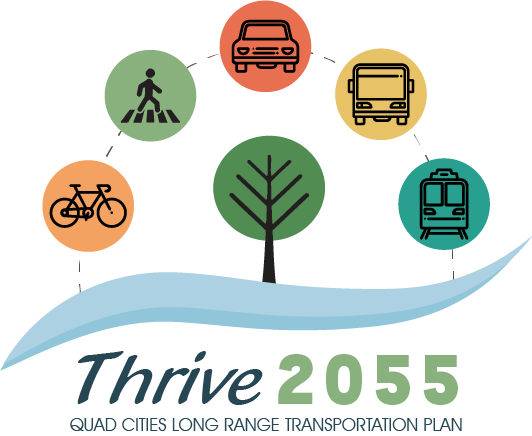January 27, 2016 – The Transportation Policy Committee concurred on initiating the public review process for the 2045 Quad Cities Long Range Transportation Plan (LRTP). Under the Committee’s direction in concert with the Transportation Technical Committee, Bi-State staff have worked for the last 4 years on the plan update. The update is a federal requirement as part of the transportation planning process of the Metropolitan Planning Organization (MPO), which is Bi-State Regional Commission. Five public input meetings are being scheduled for mid-February to roll out the draft plan. The Policy Committee will make a final recommendation to the Bi-State Regional Commission board for approval at their March 2016 meeting.
An in-depth presentation will be made at the February 24, 2016 Commission meeting, and the plan will lay on the table for a month for consideration of approval in March. Gena McCullough, Planning Director, noted that the plan addresses travel and transportation needs for the Quad Cities metropolitan planning area, today and in the future. The plan represents the two-state area with 298,005 population and 122,360 housing units (2010). It also highlights 2045 projections of population at 328,544 and housing units at 136,863. Employment is also projected from 2010 with 161,988 jobs to 188,358 jobs in 2045.
In addition to the five upcoming public information meetings, Bi-State staff have solicited other public input via a household travel survey, public input and freight surveys, a web-based meeting forum, outreach meetings, and Committee meetings. Key public travel issues include repairing the streets, completing gaps in sidewalks, being bike and transit friendly, addressing lack of funding and congestion, and seeing through on the I-74 reconstruction and Quad Cities-Chicago passenger rail projects. Other issues include river crossing capacity improvements, air quality, system reliability, connectivity, accessibility, system redundancy, safety, security, and implementation of planned projects.
Ms. McCullough indicated that the plan is required to be fiscally constrained, so there are no unrealistic wish-list projects that cannot be reasonably funded. The LRTP summarizes $8.9 billion in transportation investments on the state and local transportation system, including road expansions, road and transit operations and maintenance, trails and transportation alternatives, and transit capital projects. While not fiscally-constrained, the LRTP plan does note projects requiring additional study. It will be important to look at these types of projects that require feasibilities studies and more definitive alignments to fill future needs outlined by subsequent plan updates in five and ten years.
Click here to view the draft LRTP. Commissioners wishing to have a hard copy of the draft document should contact Gena McCullough at



